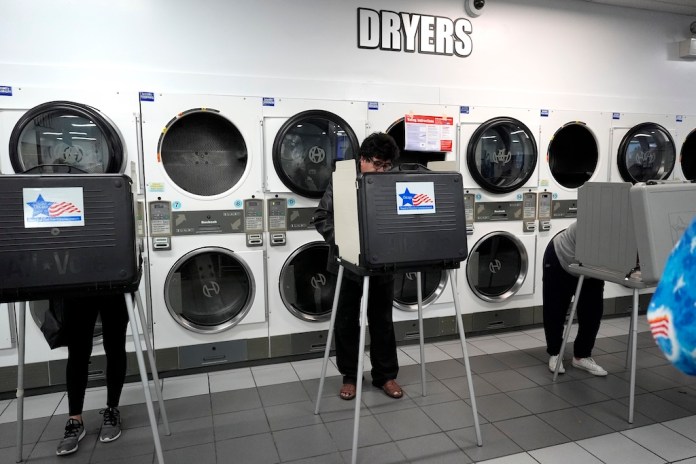Maine Voters Shoot Down Voter ID Requirement
Maine voters recently rejected a ballot measure that would have required photo identification to vote, along with other election-related reforms such as limiting ballot drop boxes and requiring written applications for mail-in ballots. According to the New York Times, about 63.4 percent opposed the measure, while 36.6 percent supported it. Critics, including a lawsuit against Maine’s Secretary of State shenna Bellows, argued that the ballot language was confusing and misleading. The article highlights that voter ID laws remain popular nationwide, supported by major polls showing strong public approval, despite opposition from Democrats and some media outlets who claim such laws suppress minority voters.evidence from states like Georgia and Texas suggests that election integrity measures, including voter ID requirements, do not hinder voter participation and may actually improve the voting process. The article underscores ongoing debates over election security and integrity in the U.S. political landscape.
Maine voters voted down a proposition that would have required voters to present photo identification in order to vote.
According to the New York Times, the proposed requirement is projected to fail, with 63.4 percent of voters voting against the measure, only 36.6 percent voting in favor, and 78 percent of the votes recorded at the time of publication.
As described by The Federalist’s Shawn Fleetwood, Maine Question 1 would “require all eligible voters to provide an acceptable form of photo identification for voting in person and by mail.” The proposition also included other election integrity reforms, such as limiting the number of ballot drop boxes to one per locality and mandating that voters submit a written application to receive a mail-in ballot.
Notably, as the Federalist previously reported, a lawsuit recently brought against Maine’s Secretary of State Shenna Bellows by a group of Maine citizens argued that the ballot question was made “deliberately confusing” and used “vague terminology … and technical language” that was “likely to be misunderstood by the average voter.” As Fleetwood noted, plaintiffs also highlighted “past examples of Bellows voicing opposition to the initiative’s provisions and voter ID requirements in general.”
The ballot question read:
Do you want to change Maine election laws to eliminate two days of absentee voting, prohibit requests for absentee ballots by phone or family members, end ongoing absentee voter status for seniors and people with disabilities, ban prepaid postage on absentee ballot return envelopes, limit the number of drop boxes, require voters to show certain photo ID before voting, and make other changes to our elections?
Perhaps Bellows’ allegedly misleading framing is unsurprising given that Democrats and their corporate media allies run endless smear campaigns against commonsense election integrity measures like voter ID.
For example, Democrats spent weeks waging a campaign against states like Georgia for enacting election reforms, including voter ID requirements, claiming such measures amounted to “Jim Crow 2.0” and “racism.”
MSNBC’s Ja’han Jones claimed in April of 2024 that election integrity laws, like voter ID laws, are “classic” examples of “voter suppression tactics that have been denounced by activists for their disproportionate impact on nonwhite voters.”
CNN’s Fredreka Schouten fearmongered in May of 2024 that “voting … will be harder than it was four years ago,” peddling claims that “strict voter ID” was partially to blame.
Despite the barrage of attacks, voter ID laws are extremely popular nationwide, with a 2024 Gallup poll finding 84 percent of Americans support requiring voters to show photo ID “at their voting place in order to vote.” A 2024 Pew study also found 81 percent of Americans favor requiring “all voters to show government-issued photo identification to vote.”
What’s more, as The Federalist reported last year, election data from Texas and Georgia shattered the “narrative that requiring eligible electors to provide ID when voting by mail ‘suppresses’ their ability to participate in the electoral process.” In Georgia specifically, an analysis from the Honest Election Project revealed how, after the state adopted its election integrity law in 2021, “[r]ejection rates for mail ballots” in the May 2022 primary “actually decreased,” and the state experienced “‘incredible’ voter turnout for that election.”
“The rejection rates in both Georgia and Texas reflect that efforts to improve voting by mail through common sense election integrity protections are worthwhile endeavors,” the analysis concluded.
This seems to line up with voter experience as well. In 2022, The Washington Post interviewed 70-year-old Patsy Reid, a black woman, who said she was shocked at just how easy it was to vote during the 2022 Georgia primaries after the left tried to convince her that Republicans would “deter us in any way possible” from voting.
“I had heard that they were going to try to deter us in any way possible because of the fact that we didn’t go Republican on the last election, when Trump didn’t win,” Reid said. “To go in there and vote as easily as I did and to be treated with the respect that I knew I deserved as an American citizen — I was really thrown back.”
" Conservative News Daily does not always share or support the views and opinions expressed here; they are just those of the writer."


